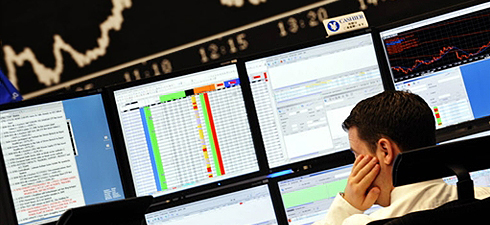“Nothing better that a good crisis now and again. It brings to light everything you hadn’t pondered before committing to a long-term project with all your faith in God and the best intentions.” Sometimes, as Dieter Wermuth argues on Zeit-Online, necessity knows no law. So the threats louring over the eurozone could induce the EU to set up an embryonic “economic government”.
“As far as the monetary union is concerned, we can’t content ourselves with a simple ‘Just carry on!’,” argues Wermuth. “We need new guarantees – or else we should give up on the whole enterprise. A monetary union cannot do without a common financial policy, or more precisely a political union.” On this head, the journalist applauds Brussels’ plans to put Greece under its oversight, which he calls “a step in the right direction”.
The need for common economic governance
The fact is that “Paris, London and Berlin have never before talked so much about coordinating EU economic policy,” observes editorialist Bernard Guetta in Libération. “In next to no time the speculative attacks on the EU’s weakest links have succeeded in putting on the European agenda ideas of “common economic governance – a barbarous expression whose use reflects the last holdouts against the obvious need for a common government over an entity that already has its own currency, institutions, central bank, elections, parliament and common market, but not a common political or tax system.”
So unexpected moves are in store for us now. “Spectacular about-face: Germany to help cash-strapped Greeks,” headlines the Financial Times Deutschland, reporting that Berlin is looking for a European solution, though not ruling out the possibility of going it alone to achieve its top priority: a stable euro.
Giving the IMF the slip
More broadly, reports Le Figaro, the eurozone countries have worked out an agreement in principle to rescue Greece, which will be presented at the European leaders’ informal summit in Brussels on 11 February. According to the French daily, the rescue “could take the form of bilateral aid, i.e. exceptional state-to-state loans on stringent conditions. Several countries would be tapped for contributions, especially Germany, the foremost economy in the eurozone.”
But Europe is eyeing another option as well, according to Le Figaro: "loan guarantees for Greece under the aegis of a European fund”. Such measures, explains Le Monde, would keep Greece from having to ask the International Monetary Fund (IMF) to help it restructure its debt: outside interference of the sort would be humiliating and a symbol of EU impotence.
Van Rompuy takes control
It remains to be seen who would be in charge of the nascent economic government. The Independent cites “leaked documents” revealing that Herman Van Rompuy "is using the financial crisis sweeping the eurozone to launch an audacious grab for power over national budgets”. The London-based daily quotes a “secret annexe” to the invitation to the Brussels summit that Mr Van Rompuy sent out to EU heads of government: "Whether it is called co-ordination of policies or economic government, only the European Council is capable of delivering and sustaining a common European strategy for more growth and more jobs." "The crisis,” adds the permanent president of the European Council, “has revealed our weaknesses.”
What he has in mind more specifically: “Budgetary plans, structural reform programmes and climate change reporting should be presented simultaneously to the Commission." As one source in Brussels sums it up, “The idea is to put all European economies under surveillance. You can expect some important decisions to be taken this week."
Was this article useful? If so we are delighted!
It is freely available because we believe that the right to free and independent information is essential for democracy. But this right is not guaranteed forever, and independence comes at a cost. We need your support in order to continue publishing independent, multilingual news for all Europeans.
Discover our subscription offers and their exclusive benefits and become a member of our community now!












